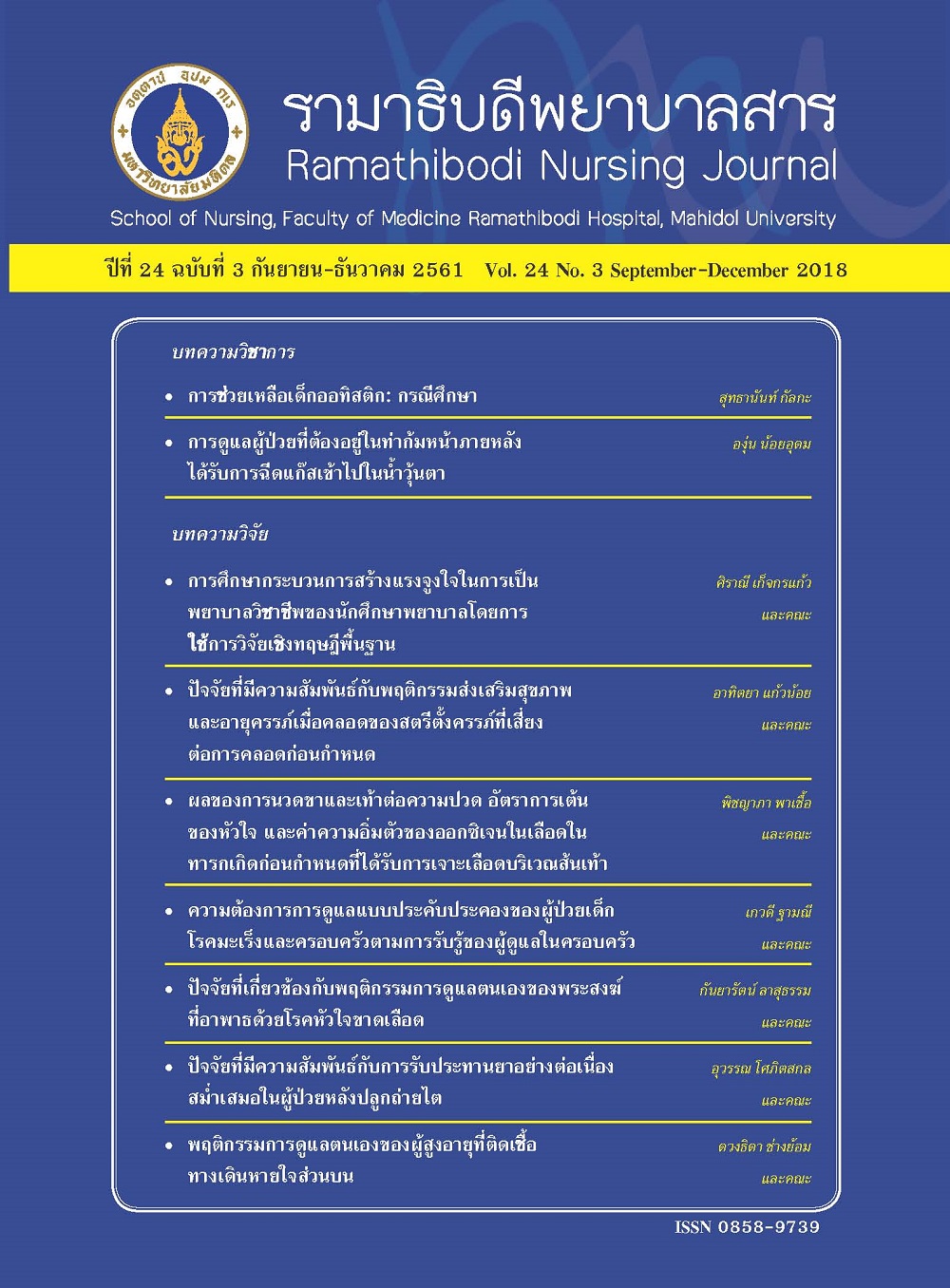Effects of Leg and Foot Massage on Pain, Heart Rate, and Oxygen Saturation in Preterm Infants Undergoing Heel Stick
Main Article Content
Abstract
Effects of Leg and Foot Massage on Pain, Heart Rate and Oxygen Saturation Caused by Heel Stick in Preterm Infants
Abstract: The present study was quasi-experimental research with a one-group crossover design which aimed at investigating the effect of massage on pain caused by heel stick in preterm infants. The premature infants’ behavioral responses to pain and physiological responses to pain, including heart rates and oxygen saturation were assessed. The study subjects were 30 premature infants who were admitted into the NICU from June 2015 to October 2015.The subjects were purposively and randomly assigned in order of treatment to both experimental and controlled conditions receiving massage and no massage prior to heel stick. The audio-visual recording was used during the heel stick procedure. The Neonatal Infant Pain Scale (NIPS) was used to measure pain scores. Paired t-test and Wilcoxon’s signed - rank test were used to analyze the pain score, oxygen saturation and heart rate. The results showed that the median pain score during and after heel stick at 5 minutes in the experimental conditions was greater than the controlled conditions with statistical significant difference, whereas the median pain score after heel stick at 1, 3, 7, and 10 minutes, mean heart rate, and mean oxygen saturation during heel stick at every time period showed no statistical significant difference. However it is recommended that effects of massage on pain using other massage techniques should be further investigated.
Keywords: Massage, Heel stick, Pain, Preterm infants
Article Details
บทความ ข้อมูล เนื้อหา รูปภาพ ฯลฯ ที่ได้รับการตีพิมพ์ในรามาธิบดีพยาบาลสาร ถือเป็นลิขสิทธิ์ของวารสาร หากบุคคลหรือหน่วยงานใดต้องการนำทั้งหมดหรือส่วนหนึ่งส่วนใดไปเผยแพร่หรือเพื่อกระทำการใด ใด จะต้องได้รับอนุญาตเป็นลายลักษณ์อักษรจากรามาธิบดีพยาบาลสารก่อนเท่านั้น
References
2. Beck S, Wojdyla D, Say L, Betran AP, Merialdi M, Requejo JH, et al. The worldwide incidence of preterm birth: a systematic review of maternal mortality and morbidity. Bulletin of the World Health Organization. 2010;88:31-8.
3. Bureau of Policy and Strategy, Ministry of Public Health. Vital statistics – birth database ; 2015 [cited 2015 June 27]. Available from : http://bps.ops.moph.go.th/Healthinformation/statistic55/2.1.5_55.pdf. (in Thai)
4. Carbajal R, Rousset A, Danan C, Coquery S, Nolent P, Ducrocq S, et al. Epidemiology and treatment of painful procedures in neonates in intensive care units. Jama. 2008;300(1):60-70.
5. Mathew PJ, Mathew JL. Assessment and management of pain in infants. Postgrad Med J. 2003;79(934):438-43.
6. Butt ML, Kisilevsky BS. Music modulates behaviour of premature infants following heel lance. Can J Nurs Res. 2000;31(4):17-39.
7. Kwanjai Piyawattanasakul. Effect of swaddling on pain response form endotracheal suction in premature infant. [thesis]. Nakhon Pathom: Mahidol University; 2004. (in Thai)
8. Pandey M, Datta V, Rehan HS. Role of sucrose in reducing painful response to orogastric tube insertion in preterm neonates. Indian J Pediatr. 2013;80(6):476-82.
9. Leite AM, Linhares MB, Lander J, Castral TC, dos Santos CB, Silvan Scochi CG. Effects of breastfeeding on pain relief in full-term newborns. Clin J Pain. 2009;25(9):827-32.
10. Modarres M, Jazayeri A, Rahnama P, Montazeri A. Breastfeeding and pain relief in full-term neonates during immunization injections: a clinical randomized trial: BMC Anesthesiol. 2013;13:22. doi:10.1186/1471-2253-13-22.
11. Jain S, Kumar P, McMillan DD. Prior leg massage decreases pain responses to heel stick in preterm babies. J Paediatr Child Health. 2006;42(9):505-8.
12. Roongnapa Kittiwat. Infant massage : a handbook for loving touch. 4th ed. Bangkok:Amarin Printing and Publishing Public; 2003. (in Thai)
13. Vimala McClure. Infant massage: a handbook for loving parents. 3rd rev. ed. New york: Bantam books; 2000
14. Melzack R, Wall PD. Pain mechanisms: a new theory. Science. 1965;150(3699):971-9.
15. Mason P. Deconstructing endogenous pain modulations. J Neurophysiol. 2005;94(3):1659-63.
16. Lloyd DM, McGlone FP, Yosipovitch G. Somatosensory pleasure circuit: from skin to brain and back. Experimental Dermatology. 2015;24(5):321-4.
17. Glass GV. Primary, secondary, and meta-analysis of research. Educational Researcher. 1976;5(10):3-8.
18. Cohen J. Statistical power analysis for the behavioral sciences. 2nd ed. Hillsdaler, New Jersey:Lawrence Erlbaum Associates Publishers; 1998.
19. Lawrence J, Alcock D, McGrath P, Kay J, MacMurray SB, Dulberg C. The development of a tool to assess neonatal pain. Neonatal Netw. 1993;12(6):59-66.
20. Supapong S. Effects of soothing and supporting program on heart rate, oxygen saturation and pain among neonates undergoing venipuncture. [thesis]. Khon Kaen: Khon Kaen University; 2000. (in Thai)
21. Ahn Y. The relationship between behavioral states and pain responses to various NICU procedures in premature infants. Journal of tropical pediatrics. 2006;52(3):201-5.
22. Badr LK, Abdallah B, Hawari M, Sidani S, Kassar M, Nakad P, et al. Determinants of premature infant pain responses to heel sticks. Pediatr Nurs. 2010;36(3):129-36.
23. Achara Chinaworn & Kaneungnid Wongpoj. Effect of Massage on Pain During Vitamin K Injection in Neonates. Songklanagarind journal of nursing. 2012;32(3):27-36. (in Thai)
24. Johnston CC, Stevens BJ, Yang F, Horton L. Differential response to pain by very premature neonates. Pain. 1995;61(3):471-9.
25. Johnston CC, Stevens BJ. Experience in a neonatal intensive care unit affects pain response. Pediatrics. 1996;98(5):925-30.
26. Evans JC, McCartney EM, Lawhon G, Galloway J. Longitudinal comparison of preterm pain responses to repeated heelsticks. Pediatr Nurs. 2005;31(3):216-21.
27. Diego MA, Field T, Hernandez-Reif M. Procedural pain heart rate responses in massaged preterm infants. Infant Behav Dev. 2009;32(2):226-9.


